

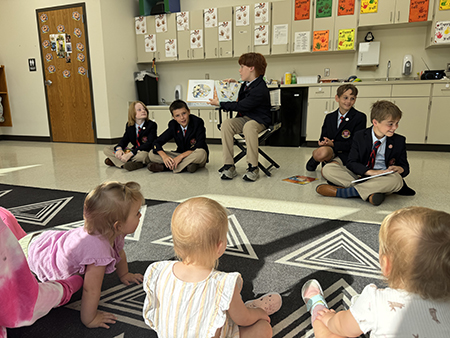
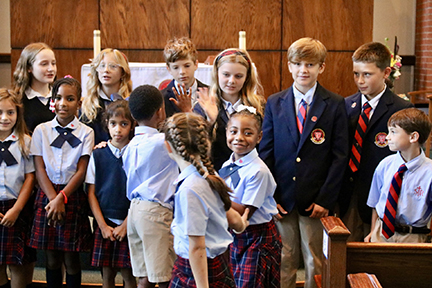






By Kate Scanlon
WASHINGTON (OSV News) – Immigrant priests, seminarians and religious in the U.S. are among those impacted by immigration enforcement policy, advocates and analysts told OSV News.
Bishop Joseph J. Tyson of the Diocese of Yakima in central Washington wrote in a recent newsletter that several seminarians in the diocese were among them, including one who was born in the U.S. but left to be with his parents, who had self-deported to Mexico.
In an interview with OSV News, Bishop Tyson said many of the priests and seminarians in his diocese come from immigrant backgrounds.
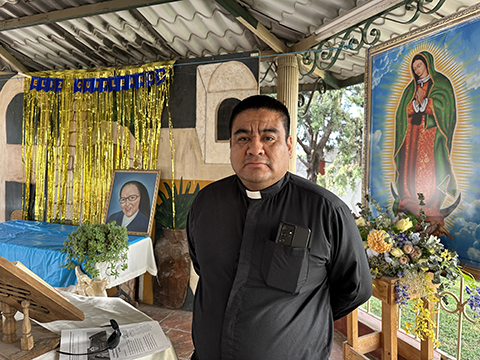
“I know how hard it is to keep my priests and my seminarians in status,” he said. “I can only imagine what it’s like for parishioners who don’t have a fleet of lawyers.”
Bishop Tyson cited a joint report released earlier this year by the National Association of Evangelicals, the U.S. Conference of Catholic Bishops’ Migration and Refugee Services, the Center for the Study of Global Christianity at Gordon-Conwell Theological Seminary, and World Relief, which found many of those vulnerable to deportation themselves – or those who have a family member vulnerable to deportation – are Christians.
More than 10 million Christians living in the U.S. would be vulnerable to deportation under Trump administration policies implemented in 2025, the report said. Christians account for approximately 80% of all those at risk of deportation, it added, and the Christians most at risk of deportation were Catholics, 61% of the total. The report found one in six Catholics (18%) are either vulnerable to deportation or live with someone who is.
J. Kevin Appleby, senior fellow for policy at the Center for Migration Studies in New York and former director of migration policy for the USCCB, told OSV News, “I think priests and religious from other nations are in a challenging situation, caught between looking after their flock here and perhaps also being a target of enforcement, even if they have legal status.”
“They can play an important role, however, in ministering to immigrants and their families, as they have a shared experience with them and understand the fear they are feeling,” Appleby said. “When push comes to shove – and loyal to their ministry – they will stand with their immigrant brothers and sisters and be a great asset to the church in the U.S. at this troubling time.”
The National Study of Catholic Priests – released in 2022 by The Catholic University of America’s Catholic Project – indicated 24% of priests serving in the U.S. are foreign-born, but the study didn’t record visa or green card status.
Of these priests, 15% were ordained outside the U.S., while others are foreign-born priests who came to the U.S. as seminarians, were ordained in the U.S. and are also subject to visa renewals, it said.
The consequence of immigration enforcement to the maximum degree, Bishop Tyson said, would mean “we have parishes without priests immediately.”
The U.S. bishops have offered their support to bipartisan congressional legislation that would ease some immigration restrictions on religious workers from other countries. The legislation, titled the Religious Workforce Protection Act, would permit religious workers already in the U.S. on temporary R-1 status with pending EB-4 applications to stay in the U.S. while waiting for permanent residency.
An April letter from the USCCB to lawmakers about the Religious Workforce Protection Act said, “Simply put, an increasing number of American families will be unable to practice the basic tenets of their faith if this situation is not addressed soon. Likewise, hospitals will go without chaplains, schools will go without teachers, and seminaries will go without instructors.”
Catholic groups are among those urging the Trump administration to address the backlog in the R-1 visa category.
Bishop Tyson said that legislation would help ease some of the challenges presented by ensuring his priests’ legal status remains in good order.
“Foreign-born religious workers play a vital role in serving immigrant communities in the U.S., often providing services in the languages people know best and offering a sense of home and support,” Miguel Naranjo, director of religious immigration services at the Catholic Legal Immigration Network, commonly known as CLINIC, told OSV News.
“With the end of the protected locations policy, we have seen growing fear in immigrant communities about ICE presence in houses of worship – and even greater risks to the religious workers themselves,” Naranjo said. “Many now carry proof of status at all times, aware of the heightened enforcement climate. Immigrants are increasingly afraid to leave home, attend services, or risk being separated from their families. Yet, despite these challenges, foreign-born religious workers remain steadfast. Their courage and commitment to their ministry have only deepened, knowing their role in serving immigrant communities is more critical than ever.”
Asked about Pope Leo XIV’s recent comments calling on the U.S. bishops to speak with a unified voice on migration issues, Bishop Tyson said, “I think we’ve got to somehow find a way of reclaiming the pulpit, because I think there’s voices outside the bishops’ conference that are very loud on this, and we have Catholics in public life that teach things that are incorrect about the human person.”
“I think that’s kind of where we the bishops really have to figure out how we’re going to work with the social media landscape, TikTok, Facebook, Instagram – the plethora of people that launch things and tend to minimize the weight of our teachings in general on Catholic social teaching, very specifically around immigration,” he said.
Catholic social teaching on immigration balances three interrelated principles – the right of persons to migrate in order to sustain their lives and those of their families, the right of a country to regulate its borders and control immigration, and a nation’s duty to regulate its borders with justice and mercy.
(Kate Scanlon is a national reporter for OSV News covering Washington. Follow her on X @kgscanlon.)
By Cindy Wooden
VATICAN CITY (CNS) – Many Christians “need to go back and re-read the Gospel” because they have forgotten that faith and love for the poor go hand in hand, Pope Leo XIV said in his first major papal document.
“Love for the poor – whatever the form their poverty may take – is the evangelical hallmark of a Church faithful to the heart of God,” the pope wrote in “Dilexi Te” (“I Have Loved You”), an apostolic exhortation “to all Christians on love for the poor.”
Pope Leo signed the document Oct. 4, the feast of St. Francis of Assisi, and the Vatican released the text Oct. 9.
The document was begun by Pope Francis, Pope Leo said, but he added to it and wanted to issue it near the beginning of his papacy “since I share the desire of my beloved predecessor that all Christians come to appreciate the close connection between Christ’s love and his summons to care for the poor.”
The connection is not new or modern and was not a Pope Francis invention, he said. In fact, throughout the Hebrew Scriptures “God’s love is vividly demonstrated by his protection of the weak and the poor, to the extent that he can be said to have a particular fondness for them.”
“I am convinced that the preferential choice for the poor is a source of extraordinary renewal both for the Church and for society,” Pope Leo wrote, “if we can only set ourselves free of our self-centeredness and open our ears to their cry.”
As he has done from the beginning of his papacy in May, the pope decried the increasing gap between the world’s wealthiest and poorest citizens and noted how women often are “doubly poor,” struggling to feed their children and doing so with few rights or possibilities.
Pope Leo also affirmed church teaching since at least the 1960s that there are “structures of sin” that keep the poor in poverty and lead those who have sufficient resources to ignore the poor or think they are better than them.
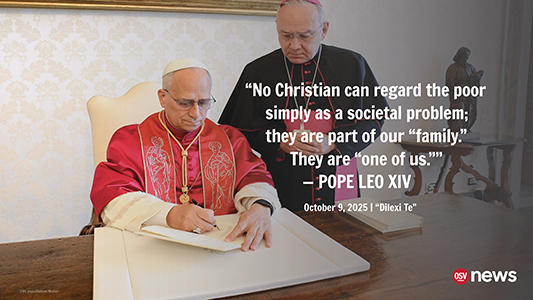
When the church speaks of God’s preferential option for the poor, he said, it does not exclude or discriminate against others, something “which would be impossible for God.”
But the phrase is “meant to emphasize God’s actions, which are moved by compassion toward the poverty and weakness of all humanity,” he wrote.
“Wanting to inaugurate a kingdom of justice, fraternity and solidarity,” Pope Leo said, “God has a special place in his heart for those who are discriminated against and oppressed, and he asks us, his Church, to make a decisive and radical choice in favor of the weakest.”
That choice, he said, must include pastoral and spiritual care as well as education, health care, jobs training and charity – all of which the church has provided for centuries.
The document includes a separate section on migrants with the pope writing, “The Church has always recognized in migrants a living presence of the Lord who, on the day of judgment, will say to those on his right: ‘I was a stranger, and you welcomed me.’”
The quotation is from the Gospel of Matthew 25:35, which is part of the “Judgment of the Nations” in which Jesus clearly states that his followers will be judged on how they care for the poor, the sick, the imprisoned and the foreigner.
“The Church, like a mother, accompanies those who are walking” in search of a better, safer life for themselves and their families, Pope Leo wrote.
“Where the world sees threats, she (the church) sees children; where walls are built, she builds bridges,” he continued. “She knows that her proclamation of the Gospel is credible only when it is translated into gestures of closeness and welcome.”
The church knows, he said, “that in every rejected migrant, it is Christ himself who knocks at the door of the community.”
In his exhortation, Pope Leo went through biblical references to the obligation to love and care for the poor and cited saints and religious orders throughout history that have dedicated themselves to living with the poor and assisting them.
A section of the document focuses on the “fathers of the church,” the early theologians, who, he said, “recognized in the poor a privileged way to reach God, a special way to meet him. Charity shown to those in need was not only seen as a moral virtue, but a concrete expression of faith in the incarnate Word,” Jesus.
Of course, for Pope Leo, an Augustinian, St. Augustine of Hippo was included in the document. The saint, “The Doctor of Grace, saw caring for the poor as concrete proof of the sincerity of faith,” the pope wrote. For Augustine, “anyone who says they love God and has no compassion for the needy is lying.”
And while the pope wrote that “the most important way to help the disadvantaged is to assist them in finding a good job,” he insisted that when that is not possible, giving alms to a person asking for money is still a compassionate thing to do.
“It is always better at least to do something rather than nothing,” Pope Leo wrote.
Still, the pope said, Christians cannot stand idly by while the global economic system penalizes the poor and makes some people exceedingly wealthy. “We must continue, then, to denounce the ‘dictatorship of an economy that kills,’” he said, quoting a phrase Pope Francis used.
“Either we regain our moral and spiritual dignity, or we fall into a cesspool,” he wrote.
“A Church that sets no limits to love, that knows no enemies to fight but only men and women to love,” Pope Leo said, “is the Church that the world needs today.”
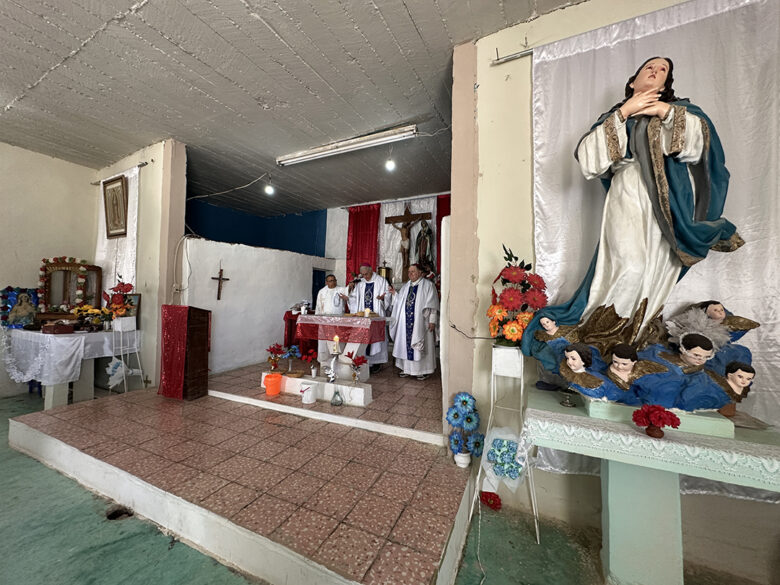
SPIRITUAL ENRICHMENT
DIOCESE/MADISON – Fall Faith Formation Day, Saturday, Nov. 15 at St. Francis, Madison from 10 a.m. to 3 p.m. The Department of Faith Formation welcomes all formation leaders and volunteers for a keynote by Robert Feduccia and a variety of breakout sessions to with the theme “Pilgrims of Hope Journeying Together.” Cost: $10. Register at https://bit.ly/FFFDay2025. Deadline is Nov. 5. Details: email fran.lavelle@jacksondiocese.org.
DIOCESE/MOBILE, Ala. – Sister Thea Bowman Jubilee of Hope Bus Pilgrimage, Nov. 15-16 to Mobile and Montgomery, Ala., for a powerful journey of faith, history and fellowship. Highlights include visits to the Africatown Heritage Center, the Equal Justice Initiative and more. Details: Visit https://bit.ly/srtheapilgrimage2025 for more info and to register.
DIOCESE/NATCHEZ – Diocesan Young Adult Pilgrimage to St. Mary Basilica in Natchez, Nov. 8. Register by Nov. 1. Cost $25. Fee does not include transportation, meals or optional overnight stay. Details: https://jacksondiocese.flocknote.com/signup/222556 or email amelia.rizor@jacksondiocese.org.
DIOCESE/CLINTON – Diocesan Youth Adult Day of Reflection “Prepare the Way,” Saturday, Dec. 6, from 10 a.m. to 2 p.m. at Camp Garaway, Clinton. Register at https://bit.ly/YAReflection25. Details: amelia.rizor@jacksondiocese.org.
CLINTON – Holy Savior, Parish Ladies Retreat, Saturday, Nov. 1, 8:30 a.m. to noon. Join us for a time of fellowship, reflection and prayer. Retreat includes Mass, presentations and lunch. Details: Register at https://bit.ly/HSLadiesRetreat112025.
GLUCKSTADT – St. Joseph, Millions of Monicas – Praying with confidence for our children, each Tuesday from 6:30-7:30 p.m. in the church. Join with other mothers and grandmothers as we pray for our children’s faithful return to the church. Details: email millionsofmonicas@stjosephgluckstadt.com.
PARISH & YOUTH EVENTS
BROOKHAVEN – St. Francis, Trunk or Treat, Wednesday, Oct. 29 at 6 p.m. on the parish playground. Details: church office (601) 833-1799.
CLINTON – Holy Savior, Fall Festival/Trunk or Treat, Wednesday, Oct. 29 from 6-7:30 p.m. in the upper parking lot. Details: church office (601) 924-6344.
GREENVILLE – St. Joseph, Trunk or Treat, Wednesday, Oct. 29 at 5:30 p.m. in the Our Lady of Lourdes parking lot. Details: Katherine at (662) 836-6108.
JACKSON – Cathedral of St. Peter the Apostle, Parish Gala, Saturday, Nov. 1 at 6 p.m. at the Capitol Club Rooftop. Join us for this no tie occassion to raise funds for the Cathedral kitchen and promote community in the parish. Details: church office (601) 969-3125.
MADISON – St. Francis, Parish Mission “Hope and Pilgrimage,” Oct. 26-27 from 5:30-7:45 p.m., with speaker and author Joan Watson. All are welcome. Please RSVP. Details: church office at (601) 856-5556.
St. Francis, Trunk or Treat, Wednesday, Oct. 29, from 6:30-8 p.m. Details: church office (601) 586-5556.
NATCHEZ – St. Mary Basilica, Trunk or Treat and Halloween Carnival, Thursday, Oct. 30 in the parking lot on Union Street across from Memorial Park. Details: church office at (601) 445-5616 or secretary@stmarybasilica.org.
PEARL – St. Jude, Remembrance Mass, Wednesday, Nov. 5 at 6 p.m. Come for a special celebration in memory of our loved ones that have gone before us. Details: office@stjudepearl.org.
SOUTHAVEN – Christ the King, Halloween Bash, Friday, Oct. 31 from 6-8 p.m. Games, concessions and more. Cost of entry: one bag of candy. Details: church office (662) 342-1073.
STARKVILLE – St. Joseph, CYO Garage Sale, Saturday, Nov. 15 from 8-11 a.m. in the parish hall. Details: church office (662) 323-2257.
EMPLOYMENT
JACKSON – Diocese of Jackson seeks a Facilities Manager to support parishes and schools. Oversees contract review, construction, and diocesan property/life-health-safety policies; manages maintenance and repairs for the Chancery and diocesan sites. Bachelor’s/associate degree in facilities or construction preferred; CFM preferred; 5+ years facilities/construction management required. Email résumé and cover letter to Cathy Pendleton at cathy.pendleton@jacksondiocese.org.
CATHOLIC SCHOOL ADMINISTRATOR POSITIONS – The Diocese of Jackson seeks qualified, faith-filled leaders to serve as administrators in our Catholic schools. Positions available at St. Joseph School, Madison (Grades 7–12), St. Joseph School, Greenville (Grades PK3–12), and St. Elizabeth School, Clarksdale (Grades PK3–6). Applicants should be practicing Catholics with leadership experience, strong communication skills, and a commitment to Catholic education. For details and applications, visit jacksondiocese.org/administrator-employment.
By Gina Christian , OSV News
(OSV News) — Young Catholic adults are invited to apply for a “once-in-a-lifetime” journey with Jesus Christ in the Eucharist across the nation.
Eight perpetual pilgrims are being sought for the 2026 National Eucharistic Pilgrimage, which takes place May 21 to July 8.
Those selected will accompany the Blessed Sacrament for the full length of the pilgrimage, forming a core group that will participate in Eucharistic processions through towns and cities, while attending daily Mass and Holy Hours. They will also carry out both service and evangelization in local communities along the entire route.
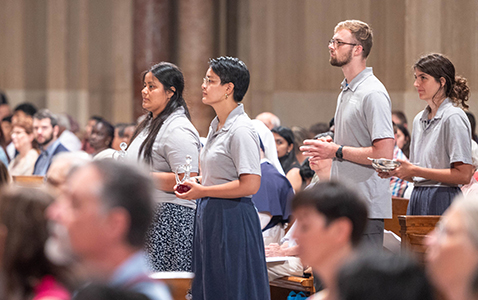
The effort is not for the faint of heart, according to the National Eucharistic Pilgrimage’s website.
“Serving as a Perpetual Pilgrim is an extraordinary call — and a serious commitment,” said its perpetual pilgrim application page. “This journey is demanding spiritually, mentally, socially, and physically — yet it is also a once-in-a-lifetime opportunity to walk in the footsteps of the Apostles.”
Applicants must baptized and confirmed Catholics ages 19-29, who are “rooted in the sacraments … faithful to the teachings of the Church and committed to daily prayer,” said the website.
In addition, pilgrims must be “flexible, resilient, and ready for communal team life on the road,” as well as “physically able to walk long distances,” which can stretch up to 15 miles on some days.
Perpetual pilgrims will engage with those they encounter along the way through faith sharing, witness talks and media interviews, and will stay in local host homes during their journey.
Training will be provided to assist the pilgrims in fundraising for mission expenses, and a spiritual director will guide the pilgrims before, during and after their trek.
Applications are due by Oct. 22.
An in-person pre-pilgrimage retreat for the perpetual pilgrims will be held Jan. 23-25, and weekly formation meetings will be conducted via Zoom on Monday evenings throughout the spring ahead of the anticipated May 21 pilgrimage start date.
The pilgrimage continues a key component of the National Eucharistic Revival, the 2022-2025 effort by the U.S. Catholic bishops to rekindle devotion to Jesus in the Eucharist. The initiative was sparked by a 2019 Pew Research Center report showing that only one third of the nation’s Catholics believed that Jesus Christ is truly present in the Eucharist.
Major highlights in the revival included the 10th National Eucharistic Congress, which took place in July 2024 in Indianapolis, and the 2024 and 2025 National Eucharistic Pilgrimages.
National Eucharistic Congress Inc., a nonprofit organization in a partnership with the USCCB, expects to continue to build on the revival’s work through its annual National Eucharistic Pilgrimages as well as diocesan, regional and national Eucharistic congresses. Organizers hope to hold the next National Eucharistic Congress in 2029, a proposal on which the U.S. bishops are expected to vote when they meet in November.
In the meantime, the upcoming 2026 pilgrimage will ” bring the healing presence of Christ across our nation, renewing the Church through encounter,” said pilgrimage organizers on the application website.
(Gina Christian is a multimedia reporter for OSV News. Follow her on X @GinaJesse Reina.)
By David Werning , OSV News
(OSV News) — At the end of our earthly lives, our faith tells us there will be four last things: death, judgment, hell and heaven. Reflecting on such ominous topics in the month in November can seem quite appropriate for both the pessimist and the optimist alike.
On the one hand, the pessimist, who focuses exclusively on his or her demise, finds the cold, dark nights of late fall and early winter, with the season’s gaunt and barren trees, a perfect composition of death.
The optimist, on the other hand, while acknowledging the inevitability of death, takes comfort in the seeds of life that are buried beneath winter’s snows and that will rise again “like wheat that springeth green.” November’s two great feasts — All Saints and All Souls — remind one of the lasting hope we have in Jesus, who has saved the world by his cross and resurrection. The forces of darkness cannot overcome him who is the light of the world.
Clearly, bringing Jesus’ saving acts to bear upon the four last things makes all the difference. Without faith, death can be seen in a merely utilitarian way. Rather than being an experience that one “lives,” including reflecting on it and preparing for it, death becomes something to be forestalled at all cost when one’s life is going well and hastened when one’s life becomes unbearable.
Thus life itself becomes simply another possession that one can have or throw away, rather than a gift to be experienced. Moreover, without faith, judgment and hell and heaven are parts of a grand fairy tale made up by weak people unwilling to face “reality” (see “Evangelium Vitae,” No. 22).
The Christian, by contrast, sees the four last things precisely as parts of a very real and profoundly meaningful life with God that extends beyond the grave. Indeed, life cannot be understood fully without acknowledging all four. Each of them reflects God’s love and mercy and justice in its own way.
Given the promises of Jesus — that he would, once and for all, destroy the power of death and open the gates of heaven — every Christian (and everyone searching for the truth) should develop a healthy appreciation of the last things. Death, judgment, hell and heaven — understood in relation to Christ — must be a part of one’s overall examination of life.
Otherwise, one may miss the blessings such an examination brings.
Worse, if God and his truth are shut out willfully, one may suffer the fate of the damned (see “Gaudium et Spes,” No. 19; “Lumen Gentium,” No. 16).
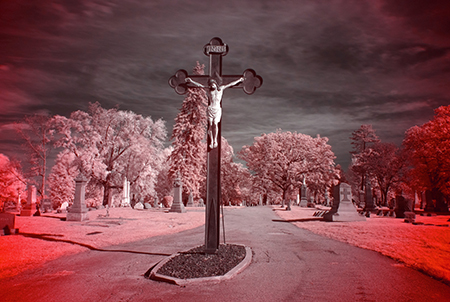
Death
Among the four last things, death is seen by both believers and nonbelievers as the end of the physical existence human beings enjoy on this earth, but that’s where the agreement ends. A faithless view stops at the grave; there’s nothing more to consider. The Catholic Church, on the other hand, sees death within the context of God’s revelation, and there’s a lot more to consider.
Based on Scripture and tradition, and ultimately on Jesus’ witness, the church recognizes death as the just punishment for the freely chosen sins of human beings: “God did not make death, nor does he rejoice in the destruction of the living. For he fashioned all things that they might have being. … It was the wicked who with hands and words invited death” (Wis 1:13-14, 16; see also Wis 2:23-24).
In the creation stories found in the book of Genesis, the authors convey the truth that God created a universe that is good, and it is designed according to his laws. God also created human beings to enjoy a relationship with him, which was to be marked not only by fidelity to his will but also by stewardship of his creation and even by the generation of new life. God made human beings in his image, male and female he made them: a communion of persons (reflecting the Trinity) who enjoyed — each one of them — the gifts of reason and free will.
In other words, when making man and woman, God did not desire automatons, but sons and daughters who would choose freely to love each other and their creator.
Human beings, however, chose not to honor their relationship with God, but instead invited death into the world by committing the original sin: rejecting the world as God created it and, instead, asserting themselves as equals to God. Hence the separation from God and the loss of mortal life. Before the first sin, human beings had eternal communion with God as a gift. After sin, an eternity without God is a real possibility.
But it’s not the only possibility. God, who gave the gift of freedom to man and woman, is supremely free. He could have responded to sin in a number of ways: scrap everything and start again, or create a new world with new creatures. God responds, however, by honoring the relationship with human beings, even though they did not. And he does so in a just and merciful way that allows both the consequences of sin to follow (i.e. death) and the gift of freedom to remain intact.
In a word, God’s response is Jesus. From the moment man and woman sinned, God set into motion his plan of salvation. Human beings could never offer an adequate recompense for their sins, so God offers it for them in the person of Jesus (see Rom 5:17). In effect, God opens the floodgates of his love. The world that had been marred by sin is thoroughly bathed in love through Jesus, “who destroyed death and brought life and immortality to light” (2 Tim 1:10).
The sinless one dies for the sinners. What could underscore so powerfully the goodness of creation and, at the same time, the evil of sin? What could convince human beings better — or more gently — that God still desires their eternal happiness than his responding to the evil of sin not with anger, not with bloodlust, but with love?
Jesus has saved the world through his life, death and resurrection. Human beings now have the opportunity to accept salvation, to turn back to God by receiving his forgiveness and yielding to his will and, after dying themselves, to enter eternal life.
Understood in the light of Jesus, death takes on a new meaning. It no longer has power over a person who abides in Jesus, for that person has been freed “from the law of sin and death” and received “the spirit of life in Christ Jesus” (Rom 8:2). St. Paul received this revelation more fully than most and ordered his life upon it: “For to me life is Christ, and death is gain. … I am caught between the two. I long to depart this life and be with Christ, (for) that is far better. Yet that I remain (in) the flesh is more necessary for your benefit” (Phil 1:21, 23-24).
St. Paul grasped the essential meaning of Jesus’ saving grace for humankind. While living, he was already united to Jesus, for the kingdom of God was already present in a hidden way (see Lk 17:20-21) and, by his ministry, Paul could bring more people to the faith as well. As for death, that would only deepen the union with Jesus.
Therefore, death need not be hastened or forestalled, but can be greeted with serenity when it comes. Passing from this life to the next is simply moving from one way of living in Jesus to another. St. Paul tried to peel away a bit of the mystery by saying, “that which is corruptible must clothe itself with incorruptibility, and that which is mortal must clothe itself with immortality” (1 Cor 15:53). Indeed, the Scriptures show that Jesus’ body had been transformed after the resurrection (see Mk 16:12; Lk 24:16; Jn 20:14, 21:4). The meaning is this: For one who remains faithful to Jesus, life is changed, not ended, at death.
Judgment
The church’s teaching on death can have both a comforting and sobering effect. It is comforting to know that life continues, but the fact that one’s time on this earth is limited should bring some weightiness to one’s decisions. But if death fails to do this, then the church’s teaching on judgment hopefully will (note that the church uses “man” in the universal sense, meaning “man and woman”): “Each man receives his eternal retribution in his immortal soul at the very moment of his death, in a particular judgment that refers his life to Christ: either entrance into the blessedness of heaven — through a purification or immediately — or immediate and everlasting damnation” (Catechism of the Catholic Church, No. 1022). There will also be a universal (or last) judgment of the entire universe at the end of time (see CCC, Nos. 1038-1041).
The basic meaning of the church’s teaching about judgment is that the choices one makes have value — they can be good or bad. Also, God determines the value of one’s choices and metes out the appropriate reward or punishment. This teaching tends to evoke two dominant feelings in people: fear and satisfaction.
Fear, of course, is not a bad feeling to have if one is living a sinful life; it might even prompt one toward conversion. Fear, in the sense of awe, is appropriate too, for God is able to judge everyone and every act in perfect justice and mercy. Only God knows the depths of each person’s heart; only he knows the advantages and disadvantages a person had; only he knows the full circumstances of every person’s life and every situation. God knows the full truth and will judge accordingly. The only bad kind of fear to have is one that is distrustful of God’s judgment, for how could God mistreat the very people he created and saved out of love?
Satisfaction is the other common feeling many people have regarding God’s judgment, which is good if by “satisfaction” one means a sense of contentment concerning God’s ultimate victory over all evil. A person who is content with God’s judgment is able to work diligently for justice on earth without vindictiveness or impatience, knowing that every good effort made at telling the truth, building solidarity, or righting wrongs cooperates with God’s victory. A “satisfaction” that hungers for revenge is not a good thing, for it reveals a distrust in God’s perfect judgment, which will have the final word (see Rom 12:17-21).
Hell
After a person has been judged, he or she will spend eternity in one of two states: hell or heaven. (Many people think of “hell” and “heaven” as places, but they are more accurately denoted vis-à-vis the relationship with God.) Hell is defined by the church as the “state of definitive self-exclusion from communion with God and the blessed” (CCC, No. 1033). God’s judgment in such a case would be to allow the person’s choice to take effect, as the Catechism relates: “God predestines no one to go to hell; for this, a willful turning away from God (a mortal sin) is necessary, and persistence in it until the end” (CCC, No. 1037).
The very mention of “hell” can cause some people to cry “unfair” (placing them in a long tradition going back at least to when Ezekiel was writing; see chapter 18). How could a loving and merciful God allow anyone to suffer eternal damnation? Other people even ignore hell and maintain that Jesus, who loves everyone, will also save everyone. Granted, the thought of hell may be horrifying, but the words of Jesus are clear: “The Son of Man will send his angels, and they will collect out of his kingdom all who cause others to sin and all evildoers. They will throw them into the fiery furnace, where there will be wailing and grinding of teeth” (Mt 13:41-42).
To understand the terrible mystery of hell, the church directs people to the mystery of freedom, which is a gift human beings have from God. It is a gift that bestows great dignity and enables the person “to initiate and control his own actions” (CCC, No. 1730). But freedom also means that the person is responsible for his or her choices. “The more one does what is good, the freer one becomes. There is no true freedom except in the service of what is good and just. The choice to disobey and do evil is an abuse of freedom and leads to the ‘slavery of sin'” (CCC, No. 1733).
Ultimately saying no to hell means saying yes to God. Again, God does not want robots that are forced to love him, but true sons and daughters who choose to love him and their brothers and sisters in freedom. Nevertheless, if they have the freedom to love, then they also must have the freedom not to love. The latter choice leads to hell.
Heaven
The alternative to hell is heaven, and whereas hell is the state of eternal separation from God, heaven is its opposite: “This perfect life with the Most Holy Trinity — this communion of life and love with the Trinity, with the Virgin Mary, the angels and all the blessed — is called ‘heaven.’ Heaven is the ultimate end and fulfillment of the deepest longings, the state of supreme, definitive happiness” (CCC, No. 1024).
And just as a person gets to hell by how he or she lives on earth, so it is with heaven. The crucial difference is that the person who chooses heaven uses his or her freedom to make every effort at yielding to and accepting God’s grace. Another difference is that a person can get to hell by oneself, but getting to heaven involves the whole body of Christ, head and members, as St. Paul reminded the Corinthians: “encourage one another and build one another up” (1 Thes 5:11).
The essence of heaven is the relationship that human beings enjoy with the Holy Trinity (which includes all the saints), a perfect communion that restores the order God intended when he first created everything. In fact, the church teaches that, following the Last Judgment, not only humanity but also the entire universe will be transformed into its glorified state (CCC, No. 1060). For human beings this means a reunification with their bodies, now immortal through the grace of the resurrection (see CCC, No. 1052).
Still, to enjoy this communion, human beings must act on God’s grace now, here on earth. What this means, practically speaking, is honoring one’s relationships as God intended. The book of Genesis suggests “that human life is grounded in three fundamental and closely intertwined relationships: with God, with our neighbor and with the earth itself” (“Laudato Si’,” No. 66). Sin disrupted these relationships, resulting in separation from God, alienation among neighbors and disharmony with the earth. God’s love in Jesus has made it possible to restore all three.
The choice is before each human person: to love as Christ loves, faithful to the Father, united in the Spirit, and working for the salvation of all. If a person joins this work now, he or she will experience its perfection in heaven.
The four last things properly understood in the context of Jesus’ life, death and resurrection need not be so ominous. For example, in what is most likely an apocryphal account, the story is told about St. Bonaventure eating a meal with his fellow friars. One of them asks Bonaventure what he would do if Jesus were to initiate the Last Judgment at that very moment. And Bonaventure answers, “I’d finish eating my soup.” Apocryphal or not, it captures well the peace, even in the face of death and judgment, of one who abides in Jesus
(David Werning writes from Virginia.)
By Carol Glatz
VATICAN CITY (CNS) – Christians must avoid using their faith to label those who are different – often the poor – as enemies to be avoided and rejected, Pope Leo XIV said.
“Some forms of worship do not foster communion with others and can numb our hearts,” he said in his homily during Mass in St. Peter’s Square Oct. 12 for the Jubilee of Marian Spirituality.
“Mary’s path follows that of Jesus, which leads us to encounter every human being, especially the poor, the wounded and sinners,” Pope Leo said in his homily. “Because of this, authentic Marian spirituality brings God’s tenderness, his way of ‘being a mother,’ to light in the church.”
Members of movements, confraternities and various Marian prayer groups were invited to Rome for their Oct. 11-12 Jubilee, which included an evening prayer service in the square Oct. 11 with Pope Leo in the presence of the original statue of Our Lady of Fatima.
The statue, brought from the Shrine of Our Lady of Fatima in Portugal, also was on display during the Oct. 12 Mass.
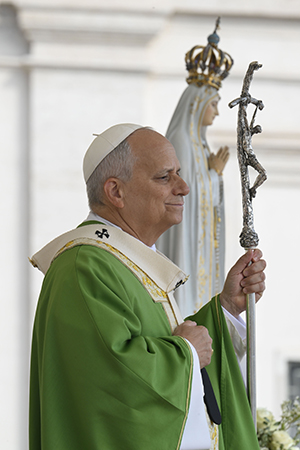
Marian spirituality, “which nourishes our faith, has Jesus as its center,” Pope Leo said in his homily. Remembering Jesus Christ is what matters.
“The celebration of Sunday, therefore, should make us Christians,” he said. “It should fill our thoughts and feelings with the burning memory of Jesus and change the way we live together and the way we inhabit the earth.”
When some forms of worship fail to foster communion with others, he said, “we fail to encounter the people God has placed in our lives. We fail to contribute, as Mary did, to changing the world, and to share in the joy of the Magnificat.”
“Let us take care to avoid any exploitation of the faith that could lead to labelling those who are different – often the poor – as enemies, ‘lepers’ to be avoided and rejected,” he said.
“Marian spirituality is at the service of the Gospel” because “it reveals its simplicity,” he said.
“Our affection for Mary of Nazareth leads us to join her in becoming disciples of Jesus,” he said, and “it teaches us to return to him and to meditate and ponder the events of our lives in which the Risen One still comes to us and calls us.”
Marian spirituality “helps us to see the proud being scattered in their conceit, the mighty being cast down from their thrones and the rich being sent away empty-handed,” he said, referring to the Canticle of Mary (Lk 1:51-54). “It impels us to fill the hungry with good things, to lift up the lowly, to remember God’s mercy and to trust in the power of his arm.”
Just as God asked Mary for her “yes,” he said, “Jesus invites us to be part of his kingdom.”
“Dear friends, in a world seeking justice and peace, let us revive Christian spirituality and popular devotion to the events and places blessed by God that have changed the face of the earth forever,” he said.
NATION
WASHINGTON (OSV News) – As the U.S. military carried out another strike on Oct. 16 against what it said was a suspected drug vessel in the Caribbean, a Notre Dame Law School expert warned that type of action, without authorization from Congress, could set the stage for the government to conduct strikes closer to home with virtually no guardrails. First reported by Reuters, the Oct. 16 strike is believed to be the first out of at least six such strikes that left survivors among the crew. Nearly 30 people have been killed in the strikes. Mary Ellen O’Connell, a professor at Notre Dame Law School who specializes in international law and conflict resolution, expressed concern that Trump “played a critical role in winning a ceasefire in Gaza only to turn around to use lawless military force in the Caribbean.” On Jan. 20, Trump issued an executive order designating certain international cartels and other organizations as “foreign terrorist organizations.” The Catechism of the Catholic Church states legitimate authorities are entrusted with preserving the common good by “rendering the unjust aggressor unable to inflict harm,” but specifies strict conditions for the use of military force including the exhaustion of all other efforts to stop such damage. O’Connell said the strikes have no justification in U.S. or international law, and there is nothing in the president’s executive order that prevents him from using this kind of lethal force in Lake Michigan, a waterway accessible from Canada but fully within U.S. territory.
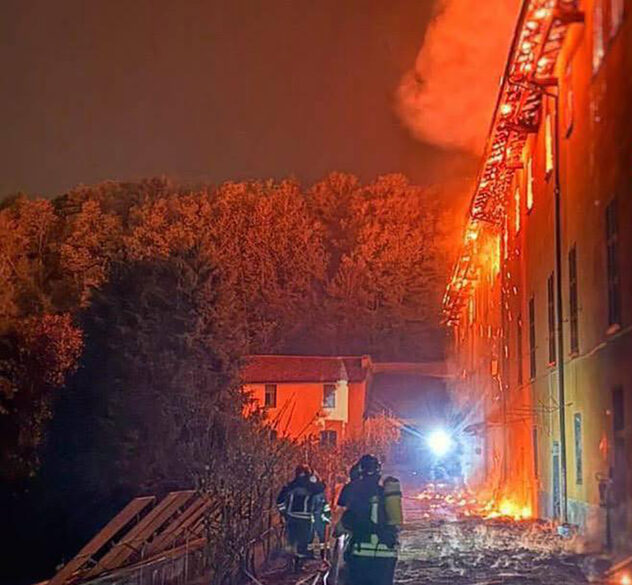
ANCHORAGE (OSV News) – Catholic dioceses in Alaska are calling for prayer and support, after flooding from a recent typhoon devastated several coastal communities. The remnants of Typhoon Halong struck the state’s western coast over the Oct. 11-12 weekend, killing at least one. Two other individuals remain missing, and hundreds of stranded residents have been airlifted to Anchorage for safety, with many watching their homes float away. According to state officials, some 1,800 Alaska residents from just under 50 communities had been displaced. In an Oct. 14 letter posted to Facebook, Bishop Steven J. Maekawa of Fairbanks asked parishioners to “pray for the people of western Alaska who were affected by the typhoon and storms this past week. For those who lost their lives and for their families and friends. For those whose homes and businesses were destroyed or damaged. For those communities that are without power, heat, and water. For the people working in the rescue and relief efforts.”
VATICAN
VATICAN CITY (CNS) – Pope Leo XIV met with a coalition of survivors of abuse and victims’ advocates for the first time at the Vatican Oct. 20. Members of the board of Ending Clergy Abuse met with the pope for about an hour in a closed-door meeting that was later confirmed by the Vatican. “This was a deeply meaningful conversation,” Gemma Hickey, ECA board president and survivor of clergy abuse in Canada, said in a press release. “It reflects a shared commitment to justice, healing and real change.” “Survivors have long sought a seat at the table, and today we felt heard,” Hickey said in the statement. “Pope Leo is very warm, he listened,” Hickey said at a news conference, according to Reuters. “We told him that we come as bridge-builders, ready to walk together toward truth, justice and healing.” While the group of six people representing ECA met with the pope, video clips from the Vatican also showed a separate meeting between Pope Leo and Pedro Salinas, a Peruvian journalist and abuse survivor. Salinas, a former member of Sodalitium Christianae Vitae who suffered physical and psychological abuse by the movement’s founder, Luis Fernando Figari, is seen in the footage giving the pope a copy of his new book, “The Truth Sets Us Free,” in Spanish.
VATICAN CITY (CNS) – Sacramental marriage and traditional family life increase joy in the good times, give strength during hard times and are a path to true holiness, Pope Leo XIV said. Marking the 10th anniversary of the canonization of Sts. Louis and Zélie Martin, the parents of St. Thérèse of Lisieux, Pope Leo said the couple “bears witness to the ineffable happiness and profound joy that God grants, both here on earth and for eternity, to those who commit themselves to this path of fidelity and fruitfulness.” The pope’s comments came in a message to Bishop Bruno Feillet of Séez, France, the home diocese of the Martin family. The message was released at the Vatican Oct. 18, the date of the anniversary of the Martins becoming “the first couple to be canonized as such,” the pope said.
WORLD
MEZCALA, Mexico (OSV News) – Another Catholic priest has been murdered in Mexico’s violence-stricken Guerrero state. Father Bertoldo Pantaleón Estrada, pastor of San Cristóbal Parish in Mezcala, was found dead Oct. 6 – two days after disappearing. According to press reports, he was shot twice in the neck, and federal officials have named his driver as the prime suspect. “At this time, we have no indication that the father was involved in anything wrong,” Federal public security secretary Omar García Harfuch said Oct. 7. Father Pantaleón’s death underscores the growing danger for clergy in cartel-controlled regions. Guerrero, once a hub for heroin production, remains plagued by organized crime, extortion, and kidnappings. The Diocese of Chilpancingo-Chilapa, where the priest served, has suffered multiple clergy killings in recent years. The Mexican bishops’ conference condemned the violence, calling for a full and transparent investigation. Since 2006, at least 52 priests have been killed in Mexico – making it the deadliest country in the world for Catholic clergy.
LA VALLETTA BRIANZA, Italy (OSV News) – A devastating fire has gutted a 17th-century monastery in northern Italy where newly canonized St. Carlo Acutis once received his first Communion. The blaze broke out on Oct. 11 at Bernaga Monastery in La Valletta Brianza, reducing much of the wooden structure to ruins. Thankfully, all 22 cloistered nuns inside survived, with one sister raising the alarm just in time. Archbishop Mario Delpini of Milan expressed deep sorrow, calling the fire a tragic loss of sacred heritage and personal belongings. The monastery had just marked the Jubilee of Consecrated Life and was preparing to celebrate St. Carlo’s first official feast day on Oct. 12. A first-class relic of the young saint – a lock of his hair – was saved from the flames, though a crucifix gifted by St. Paul VI remains missing. Authorities suspect an electrical short circuit may have sparked the fire. Investigations are ongoing as the faithful rally in prayer and support. According to the archdiocese, from a young age, St. Carlo was “fond of the nuns” at the monastery. It was there that he was introduced to Bishop Pasquale Macchi. It was Bishop Macchi, the archdiocese said, that informed St. Carlo’s parents that the 7-year-old future saint was ready for his first Communion.
By Junno Arocho Esteves
(OSV News) – When Pope Leo XIV raised three women and four men to the altar on Oct. 19, he canonized a diverse group of religious and lay men and women, all bound by the virtue of holding on to their faith amid spiritual and external challenges.
The canonizations, which were announced by the Vatican June 13 during the pope’s first ordinary public consistory, elevated to sainthood seven candidates who hail from Venezuela, Turkey, Papua New Guinea and Italy.
St. María Carmen Elena Rendiles Martínez, who was born without a left arm, overcame physical challenges and founded a religious congregation, the Servants of Jesus of Caracas, which was dedicated to pastoral ministry and education.
St. Maria Troncatti, an Italian Salesian, dedicated her life as a missionary to Indigenous peoples in the Amazon rainforest, earning her the informal title of “doctor of the jungle,” while St. Vincenza Maria Poloni dedicated her ministry to the sick and the poor, whom she deemed as “our masters.”
Others, such as St. Ignazio Choukrallah Maloyan, an Armenian Catholic archbishop, and St. Peter To Rot, were martyred for their faith.
Among the most well-known is St. Bartolo Longo, a former Satanist priest who, after his conversion, dedicated his life as a Dominican tertiary to promoting the rosary and Marian devotion.
For Dominican Father Joseph Anthony Kress, promoter of the rosary for the Province of St. Joseph and associate director of the Dominican Friars Foundation, the example of the challenges faced by St. Longo and the other six sainthood candidates shows “that this earthly pilgrimage is not a sanitized experience.”
Speaking to OSV News Oct. 10, Father Kress said that like Christ, who stumbled and fell “on his way to making that supreme sacrifice,” Christian lives reflect the same struggle.
“We don’t need to try to perfect or sanitize our lives before we offer them to Jesus, but we can invite him into the suffering and the struggle,” he said.
“All of these saints experienced different elements of struggle throughout their lives: physical struggles, psychological struggles, spiritual desolations. But in the midst of all of that, they maintained a constant relationship with the Lord and invited him into those moments.”
“That’s where holiness is,” Father Kress added.
Another notable aspect of some of the candidates is the fact that they were lay members of the Catholic Church. St. Longo was a lay member of the Dominican order, while St. José Gregorio Hernández Cisneros of Venezuela was a Franciscan tertiary. St. Peter To Rot, a martyr from Papua New Guinea, was married and served as a lay catechist.
Father Kress told OSV News that those like Sts. Longo and Hernández prove that “we can still be inspired by the great charisms of these religious orders in the Catholic Church, and to be unafraid to pursue that; to be unafraid of committing to that.”
“We live in a society, man, that is just so fraught and afraid to make any kind of commitment to a specific thing,” he said. “And some of these saints who have been tertiaries have made those commitments, and it’s a great message of hope and confidence in the Lord, and confidence in our individual humanity and personalities to say, ‘This charism is something that attracts me, and I want to participate in that in ways that make sense.’”
Below are brief summaries of the church’s seven newest saints:
St. María Carmen Elena Rendiles Martínez was a Venezuelan religious sister and founder of the Servants of Jesus of Caracas. Born without a left arm, her life exemplified overcoming physical challenges. She established the Servants of Jesus of Caracas in 1965, dedicating her community to education and spiritual outreach. She died May 9, 1977, in Caracas. She is Venezuela’s first female saint.
St. José Gregorio Hernández Cisneros was a Venezuelan physician and scientist known widely as the “Doctor of the Poor.” Born Oct. 26, 1864, in Isnotú, Venezuela, he was instrumental in introducing modern medical science to the country and founded its first bacteriology laboratory. A devoted layman and Franciscan tertiary, he provided free medical care to the poor throughout his career. He died June 29, 1919, in Caracas after being struck by an automobile while running an errand for a sick patient.
St. Ignazio Choukrallah Maloyan was the Armenian Catholic archbishop of Mardin. Born April 19, 1869, in Mardin, Ottoman Empire (now Turkey), he was consecrated as archbishop in 1911. During the Armenian Genocide in 1915, he was arrested by Ottoman authorities who demanded he renounce his Christian faith and convert to Islam. He refused and was subsequently tortured and martyred on June 11, 1915.
St. Peter To Rot was a married father and lay catechist from Papua New Guinea. Born in 1912 in Rakunai, he took on a vital leadership role when Japanese forces imprisoned missionaries during World War II. He became the sole spiritual guide for his community and strongly defended Christian marriage against the Japanese-promoted return of polygamy. For this opposition, he was arrested. He was martyred in a Japanese prison camp in Rakunai, Papua New Guinea, in July 1945.
St. Vincenza Maria Poloni (born Luigia Poloni) was an Italian religious sister and co-founder of the Sisters of Mercy of Verona. Born Jan. 26, 1802, in Verona, she dedicated her life to works of charity. She helped establish the congregation in 1840 to care for the sick, the poor, and orphans, emphasizing merciful love for the marginalized. She famously referred to the poor as “our masters.” She died Nov. 11, 1855, in Verona.
St. Maria Troncatti was a Salesian nun and nurse who served as a missionary in the Amazon rainforest. Born Feb. 16, 1883, in Corteno Golgi, Italy, she arrived in Ecuador in 1922 and spent nearly five decades working among the Indigenous Shuar people. Known as the “doctor of the jungle,” she ministered to physical and spiritual needs, notably promoting the dignity of women and reconciliation among tribal groups. She died Aug. 25, 1969, in Sucúa, Ecuador, in a small plane crash while traveling to a retreat.
St. Bartolo Longo was an Italian lawyer and lay Dominican tertiary. Born Feb. 10, 1841, in Latiano, he experienced a dramatic conversion after a period of involvement with a spiritualist cult, which included being consecrated as a satanic priest. He devoted his life to promoting the rosary and serving the materially and spiritually poor peasants near Pompeii, where he founded the Shrine of Our Lady of the Rosary of Pompeii and several charitable institutions for children. He died Oct. 5, 1926, in Pompeii.
(Junno Arocho Esteves writes for OSV News from Malmö, Sweden.)
